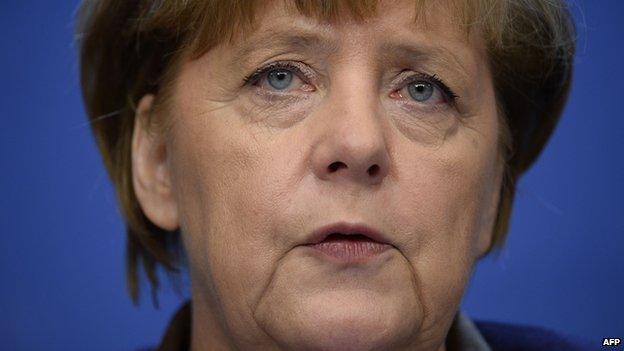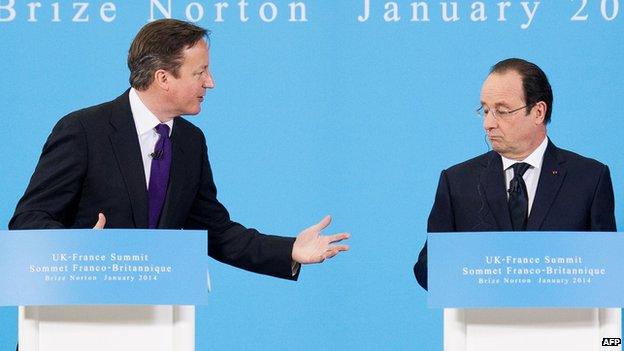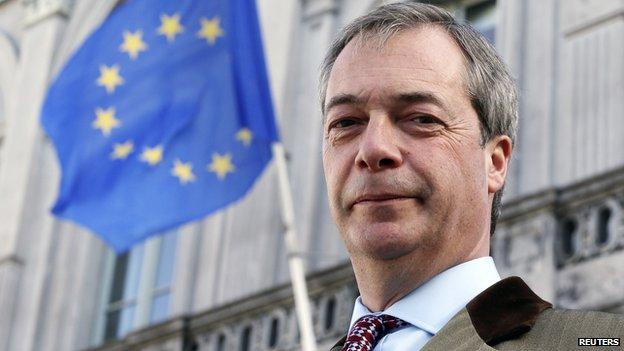Merkel beats wary path to London amid uncertain EU ties
- Published

German Chancellor Angela Merkel is one of the European Union's most dominant figures
As Chancellor Merkel heads to London, there's been a determined effort back home in Berlin to dampen expectations.
The message is: don't expect the German leader to open her handbag with a great flourish and produce all sorts of goodies for David Cameron as he tries to assuage the demands of those Conservatives who want wholesale change in the European Union.
The message from Berlin is that Britain is a very valued member of the European Union and the EU is stronger with Britain in - but it's not the only friend Germany has (at which point some of her confidantes add that Britain never chose to join the Euro whereas France did).
And they add that it is no secret that Angela Merkel was dismayed when the British Conservatives decided not to participate with the main centre-right grouping in the European parliament which includes Chancellor Merkel's CDU.
And they add yet further that they are still waiting for Britain to say exactly what changes it would like to make in the treaties of the European Union.
Bemusement
It would be too strong to say that the mood at the heart of the German government is one of dismay at Britain's determination to renegotiate its relations ahead of a British referendum on membership in 2017 if the Conservatives are still in power in Westminster then.

David Cameron has been discussing Britain's relationship with the EU with several leaders in recent months
But if you talk to her policy-makers, it is true to say that there is bemusement at the way the debate in Britain is being carried out, both in parliament and in the press. They don't say it but Britain's alliance with the United States over the sharing of intelligence probably doesn't help, particularly after the revelation of American eavesdropping on the chancellor's phone.
In Britain, the message is that "the reddest of red carpets will be rolled out". In Berlin, the message is: the visit is important - and Britain is important - but it's not the only member of the European Union.
The theme of the speech to the combined Houses of Parliament in Westminster is expected to be the immediate need to improve the competitiveness of the whole European economy. It is not the stuff of high rhetoric (that's not Angela Merkel's way) but it is for the German chancellor the bread-and-butter.
She has said that she wants more co-ordination of economic policy between countries of the European Union. In a very Merkel way, she hasn't quite ruled out changes in the Lisbon Treaty which annoys many British Eurosceptics - but she is not highlighting the need for large-scale change.
There is no talk in Berlin, for example, of sweeping repatriation of powers from Brussels to the national capitals, something which some British Eurosceptics want.
As Michael Wohlgemuth, the director of the Open Europe organisation in Berlin (which campaigns for reform) put it to the BBC: "A very new treaty has almost become impossible at the moment. Treaty change is regarded as a Pandora's box by most heads of state and governments because it would mean ratification procedures, perhaps referendums, in their own countries. This is why I think there will be some change in interpretation of the treaties - people will find a middle way to engage in reforms that won't necessitate treaty change."

Eurosceptics such as UKIP's Nigel Farage have been putting pressure on David Cameron to leave the EU
The influential CDU MP and Merkel ally Gunther Krichbaum told the BBC that he is uneasy when people talk about renegotiating EU treaties: "All these treaties are already a compromise so there would be a risk of sitting in a conference room together for years and finally getting the same result. But Britain and Germany do have a common target to improve the European Union."
What may well happen is a quiet agreement over months to adjust the way the EU operates, perhaps giving more power to individual parliaments - but short of fundamental treaty change.
Canny politician
David Cameron does have a good card to play. Angela Merkel would prefer Britain to stay in the European Union. If Britain left, Germany would be the unambiguously dominant power. That sits uneasily in the minds of many Germans as the country gains in economic strength and comes to terms with its position.
She may well agree to concessions to Britain - but not immediately. There is an election on the way in Britain. Governments change. Mrs Merkel is as canny a politician as they come. The speech to the combined Houses of the British Parliament will be broad and friendly - but short of the measures the British government might want.
The last time a German chancellor addressed both Houses of Parliament in Westminster was in March, 1970. Willy Brandt came and met Harold Wilson and expounded at length in English. Chancellor Merkel follows nearly half a century later. She will speak in German - a mark of the growing confidence of her nation.
She will tread as carefully as Chancellor Brandt - but she comes as a woman at the peak of her powers, leading a country whose power is only going up.
- Published27 February 2014
- Published31 January 2014
- Published30 December 2013
- Published4 November 2013